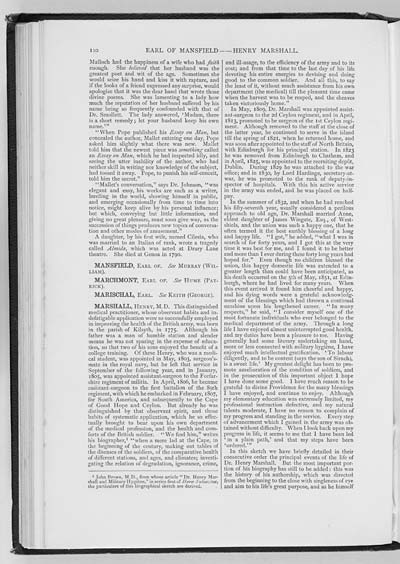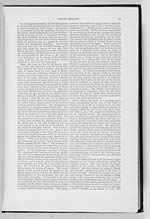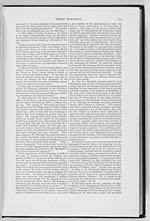Volume 3 > Half-Volume 5
(123) Page 110 - Marshall, Henry, M.D.
Download files
Individual page:
Thumbnail gallery: Grid view | List view

110 Malloch had the happiness of a wife who had faith enough. She believed that her husband was the greatest poet and wit of the age. Sometimes she would seize his hand and kiss it with rapture, and if the looks of a friend expressed any surprise, would apologize that it was the dear hand that wrote those divine poems. She was lamenting to a lady how much the reputation of her husband suffered by his name being so frequently confounded with that of Dr. Smollett. The lady answered, 'Madam, there is a short remedy; let your husband keep his own name.' " "When Pope published his Essay on Man, but concealed the author, Mallet entering one day, Pope asked him slightly what there was new. Mallet told him that the newest piece was something called an Essay on Man, which he had inspected idly, and seeing the utter inability of the author, who had neither skill in writing nor knowledge of the subject, had tossed it away. Pope, to punish his self-conceit, told him the secret." "Mallet's conversation," says Dr. Johnson, "was elegant and easy, his works are such as a writer, bustling in the world, showing himself in public, and emerging occasionally from time to time into notice, might keep alive by his personal influence; but which, conveying but little information, and giving no great pleasure, must soon give way, as the succession of things produces new topics of conversa- tion and other modes of amusement." A daughter, by his first wife, named Cilesia, who was married to an Italian of rank, wrote a tragedy called Almida, which was acted at Drury Lane theatre. She died at Genoa in 1790. MANSFIELD, EARL OF. See MURRAY (WIL- LIAM). MARCHMONT, EARL OF. See HUME (PAT- RICK). MARISCHAL, EARL. See KEITH (GEORGE). MARSHALL, HENRY, M. D. This distinguished medical practitioner, whose observant habits and in- defatigable application were so successfully employed in improving the health of the British army, was born in the parish of Kilsyth, in 1775. Although his father was a man of humble station and slender means he was not sparing in the expense of educa- tion, so that two of his sons enjoyed the benefit of a college training. Of these Henry, who was a medi- cal student, was appointed in May, 1803, surgeon's- mate in the royal navy, but he left that service in September of the following year, and in January, 1805, was appointed assistant-surgeon to the Forfar- shire regiment of militia. In April, 1806, he became assistant-surgeon to the first battalion of the 89th regiment, with which he embarked in February, 1807, for South America, and subsequently to the Cape of Good Hope and Ceylon. But already he was distinguished by that observant spirit, and those habits of systematic application, which he so effec- tually brought to bear upon his own department of the medical profession, and the health and com- forts of the British soldier. "We find him," writes his biographer,1 "when a mere lad at the Cape, in the beginning of the century, making out tables of the diseases of the soldiers, of the comparative health of different stations, and ages, and climates; investi- gating the relation of degradation, ignorance, crime, 1 John Brown, M.D., from whose article "Dr. Henry Mar- shall and Military Hygiene," in series first of Hor� Subseciv�, the particulars of this biographical sketch are derived. and ill-usage, to the efficiency of the army and to its cost; and from that time to the last day of his life devoting his entire energies to devising and doing good to the common soldier. And all this, to say the least of it, without much assistance from his own department (the medical) till the pleasant time came when the harvest was to be reaped, and the sheaves taken victoriously home." In May, 1809, Dr. Marshall was appointed assist- ant-surgeon to the 2d Ceylon regiment, and in April, 1813, promoted to be surgeon of the 1st Ceylon regi- ment. Although removed to the staff at the close of the latter year, he continued to serve in the island till the spring of 1821, when he returned home, and was soon after appointed to the staff of North Britain, with Edinburgh for his principal station. In 1823 he was removed from Edinburgh to Chatham, and in April, 1825, was appointed to the recruiting depot, Dublin. During 1829 he was attached to the war office; and in 1830, by Lord Hardinge, secretary-at- war, he was promoted to the rank of deputy-in- spector of hospitals. With this his active service in the army was ended, and he was placed on half- pay. In the summer of 1832, and when he had reached his fifty-seventh year, usually considered a perilous approach to old age, Dr. Marshall married Anne, eldest daughter of James Wingate, Esq., of West- shiels, and the union was such a happy one, that he often termed it the best earthly blessing of a long and happy life. "I got," he added, "what I was in search of for forty years, and I got this at the very time it was best for me, and I found it to be better and more than I ever during these forty long years had hoped for." Even though no children blessed the union, this happy domestic life was extended to a greater length than could have been anticipated, as his death occurred on the 5th of May, 1851, at Edin- burgh, where he had lived for many years. When this event arrived it found him cheerful and happy, and his dying words were a grateful acknowledg- ment of the blessings which had thrown a continual sunshine upon his lengthened career. " In many respects," he said, "I consider myself one of the most fortunate individuals who ever belonged to the medical department of the army. Through a long life I have enjoyed almost uninterrupted good health, and my duties have been a pleasure to me. Having generally had some literary undertaking on hand, more or less connected with military hygiene, I have enjoyed much intellectual gratification. 'To labour diligently, and to be content (says the son of Sirach), is a sweet life.' My greatest delight has been to pro- mote amelioration of the condition of soldiers, and in the prosecution of this important object I hope I have done some good. I have much reason to be grateful to divine Providence for the many blessings I have enjoyed, and continue to enjoy. Although my elementary education was extremely limited, my professional instruction defective, and my natural talents moderate, I have no reason to complain of my progress and standing in the service. Every step of advancement which I gained in the army was ob- tained without difficulty. When I look back upon my progress in life, it seems to me that I have been led 'in a plain path,' and that my steps have been 'ordered.'" In this sketch we have briefly detailed in their consecutive order the principal events of the life of Dr. Henry Marshall. But the most important por- tion of his biography has still to be added: this was the history of his authorship, which was directed from the beginning to the close with singleness of eye and aim to his life's great purpose, and as he himself
Set display mode to:
![]() Universal Viewer |
Universal Viewer | ![]() Mirador |
Large image | Transcription
Mirador |
Large image | Transcription
Images and transcriptions on this page, including medium image downloads, may be used under the Creative Commons Attribution 4.0 International Licence unless otherwise stated. ![]()
| Biographical dictionary of eminent Scotsmen > Volume 3 > Half-Volume 5 > (123) Page 110 - Marshall, Henry, M.D. |
|---|
| Description | Spine title: Half-Vol. V. Macadam to Smith. |
|---|---|
| Description | Volume III. Contains names alphabetically from Macadam to Young. |
|---|

